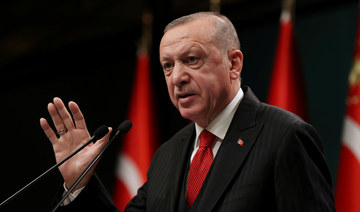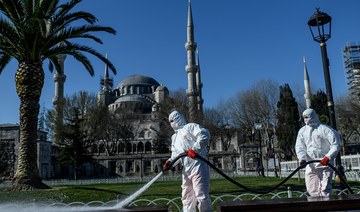ANKARA: A much-awaited presidential decree on the appointment of 54 Turkish ambassadors to missions abroad was issued on Tuesday.
Some of the selections were seen as political, especially that of Murat Mercan, the current ambassador to Japan, who will take up the post of top envoy in Washington.
Experts believe the appointment of the 61-year-old politician to the US post could be a veiled message to incoming American President-elect Joe Biden’s administration that Turkey was ready to open a new page in bilateral relations.
Mercan, who is not a career diplomat, has served as a member of the Turkish parliament under the ruling Justice and Development Party (AKP), and was deputy energy minister until he resigned from the position in 2014. He holds a doctoral degree from Florida University and is known to be close to former Turkish President Abdullah Gul.
Soner Cagaptay, a Turkish academic from the Washington Institute for Near East Policy, told Arab News that the latest ambassadorial appointments could be characterized as a “mini-revolution” in the context of the Turkish Ministry of Foreign Affairs’ traditional approach.
“There is a political appointment for the first time to arguably the capital city of Turkey’s most important ally, the US. He is a pragmatic politician. But it is a quite significant departure from the tradition of positions that were previously filled by career diplomats for centuries,” he said.
Mercan will face a tough agenda, starting with potential CAATSA (Countering America’s Adversaries Through Sanctions Act) sanctions over Turkey’s purchase of the Russian S-400 missile defense system.
The terms of the sanctions have been recently changed under the annual defense policy bill to mandate the president to impose at least five sanctions on Turkey within 30 days. The duty for the implementation of the sanctions is expected to fall to the Biden administration, due to be inaugurated on Jan. 20.
Another challenge for the envoy will be the Halkbank court case, kicking off in New York on March 3, over the evasion of US sanctions on Iran.
Emre Caliskan, a research fellow at the UK’s Foreign Policy Center, told Arab News that the new ambassadors had been carefully selected by Turkish President Recep Tayyip Erdogan.
“Changing of ambassadors in countries where Turkey has had some diplomatic disputes is an indication that Erdogan wants to have a fresh start with these countries. For example, Murat Mercan’s appointment to Washington indicates Erdogan’s intention of wanting a fresh start with the Biden administration,” he said.
He added that although Mercan’s had been a political appointment, it would be viewed positively by US officials who have accused the current Turkish envoy of being Erdogan’s “long arm” in Washington.
“Picking a political appointment for the US also indicates that Erdogan wants to have a direct channel with Joe Biden, similar to his relationship with (American President) Donald Trump,” Caliskan said.
Turkey’s appointment of the current ambassador to Tunisia, Ali Onaner, as envoy to France is also being viewed as significant, as he was a classmate of French President Emmanuel Macron at ENA (Ecole Nationale d’Administration).
Onaner, a career diplomat, congratulated Macron in a tweet when his friend won the first round of the presidential elections in April 2017. However, he recently verbally attacked the French leader on Twitter over his call for Turkey to reopen “responsible dialogue channels.”
In a tweet on Sept. 9, Onaner said: “I have a friendly advice to my schoolmate Macron: Move forward, don’t wait, keep going.”
French media have referred to Onaner’s appointment as Ankara’s extension of an “olive branch” to Paris.
The approaching EU summit on Dec. 10 and 11, when potential sanctions against Ankara over its disputed activities in the eastern Mediterranean are likely to be discussed, will also have inevitable repercussions for the country’s relations with France.
“Appointments in France and other European cities also indicate that Erdogan wants to have a better relationship with the EU. Most of the appointments in the EU cities are respected career diplomats,” Caliskan added.
Separately, economist Kerem Alkin, a columnist for a number of pro-government newspapers, was appointed as Turkey’s permanent representative of the Organization for Economic Cooperation and Development (OECD), while Mehmet Gulluoglu, the current head of Turkey’s Disaster and Emergency Management Authority, has been named Turkish ambassador in Dar es Salaam, Tanzania.
Burak Akcapar, a career diplomat who served in the US, at NATO, and in Germany, was appointed envoy to Spain.
Tugay Tuncer becomes ambassador to the UAE and Fatih Ulusoy will be the new envoy to Saudi Arabia, two problematic hotspots for Turkey’s relations with Gulf countries. Caliskan said Erdogan’s choices for the Abu Dhabi and Riyadh posts signified that Turkey wanted to improve its relations with the two nations.
“The new ambassador to Abu Dhabi, Tugay Tuncer was the deputy chief of mission in the Turkish Washington embassy. Similarly, before his ambassadorship in Ethiopia, Fatih Ulusoy was charge d’affairs of the Turkish embassy in London. The two appointees are experienced career diplomats who have worked in Washington and London,” he added.
Recent high-level dialogue has reportedly been taking place between Turkey and Saudi Arabia.
However, only months ago there was speculation about a possible cut-off in diplomatic ties after Erdogan warned on Aug. 14 that Turkey was considering closing its embassy in Abu Dhabi and suspending diplomatic ties with the UAE over its accord to normalize relations with Israel.
Two weeks ago, the UAE suspended travel visas for nationals from 13 countries, including Turkey, for “security reasons.”
In another tactical move on envoys, Kenan Yilmaz, an active bureaucrat during the diplomatic negotiations over the conflict in Libya, has been appointed as Turkish ambassador to Tripoli.
























